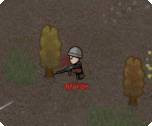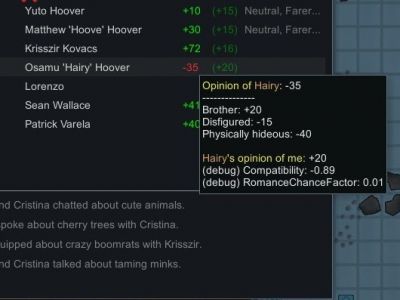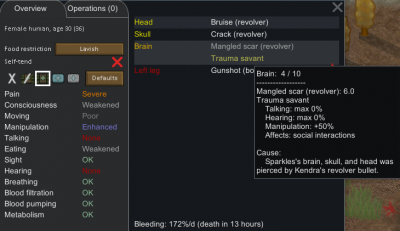Injury
|
| This article is a stub. You can help RimWorld Wiki by expanding it. Reason: How does tend quality work? Scar information. |
Injuries are physical damage to a living being. Humanoids, animals, and mechanoids can sustain injuries from many sources, which each have their own Damage Type. A colonist in shock from extreme pain or incapacitated due to loss of movement becomes 'downed'. Doctors will automatically rescue downed colonists.
Injury types
Different weapons cause different types of injuries. For example, a mace will crush, a longsword will cut, and fire will burn. The type of injury impacts the amount of pain it causes, the rate of bleeding, and the chance of infection
Summary
Injuries reduce a body part's health, its efficiency, and causes pain to the pawn.
Damage
Every body part has a health value, which is lowered every time it takes damage. When it reaches 0, the part is completely destroyed.
Damage also lowers a body part's efficiency, proportional to its health remaining. For example, if a arm has 15/30 health, then that arm performs 50% worse. As each arm is responsible for 50% Manipulation, this results in the pawn having -25% Manipulation until the injury is healed. Some parts, like the torso, are not responsible for any pawn stat, but still take damage and cause pain.
Pain
The greater the damage, the larger the pain. Pain reduces Consciousness directly, which reduces most pawn capabilities.
Excessive pain causes pain shock, the most common way to down pawns in combat. Most pawns have a Pain Shock Threshold of 80%. Note that enemies have a chance to immediately die when downed from pain shock, but not from other means, like blood loss or heat stroke.
Mechanoids are machines, and are immune to pain. In humans, it can be completely eliminated with a painstopper, or reduced for a short time with go-juice or the Painblock psycast![]() .
.
Bleeding
Bleeding is a common occurance from certain damage types. While an injury is bleeding, pawns will gain blood loss, scaling with the wound and amount of wounds. Total blood loss is listed under whole body, with a tooltip showing the percent. If blood loss reaches 100%, the pawn will die. Bleeding pawns will also leave blood on the ground, making the area dirty.
Bleeding always stops immediately with tending, regardless of the tend quality or medicine used. However, higher quality medicine can cover more wounds at once, which can stop a pawn from bleeding out faster. Injuries will also heal on their own, though a lost limb will always continue to bleed until tended to.
The coagulator ![]() implant halves the rate of blood loss, while the Superclotting gene
implant halves the rate of blood loss, while the Superclotting gene ![]() rapidly stops bleeding. The ability added by the Coagulate
rapidly stops bleeding. The ability added by the Coagulate ![]() gene also immediately tends all wounds on the target pawn, instantly stopping bleeding.
gene also immediately tends all wounds on the target pawn, instantly stopping bleeding.
Infection
Infections can occur whenever a pawn is hurt by a bite, burn, frostbite, or any damage type that causes bleeding. Missing body parts won't cause infection. Once a pawn recieves these injuries, the game starts a random timer between 15,000 ticks (4.17 mins) to 45,000 ticks (12.5 mins), per injury. The chance of infection depends on:
- Damage type. Bite, burn or frostbite wounds have a 25% chance, other bleeding wounds have a 10% to infect.
- Tend quality. The multipler is 85% at 0% tend quality, linearly decreasing to 5% at 100% tend quality.
- Location. The higher the Cleanliness, the lower the chance for infection (50% at 0 Cleanliness).
Scaring
Scars are lasting markers of injuries. They permanently lower the health of the scarred body part, reducing their efficiency. They also cause a character a small amount of pain, even if the relevant body part is otherwise healed. The chance of scarring depends on damage type and the part being damaged. The eyes are particularly vulnerable to scars, while brain damage will always be permanent.
Scars can be healed by a limited number of ways. Luciferium and the Scarless gene![]() heal 1 scar every 15-30 days. A biosculpter pod
heal 1 scar every 15-30 days. A biosculpter pod![]() can do Bioregeneration, which costs
can do Bioregeneration, which costs ![]() 2 glitterworld medicine and takes time to complete. A healer mech serum can heal scars, but is very rare.
2 glitterworld medicine and takes time to complete. A healer mech serum can heal scars, but is very rare.
Healing
Injured colonists will recover from their wounds over time. Tending to a wound and resting in bed speeds up recovery.
Healing Rate
Every 600 ticks (10 secs), heal rate × 0.01 points of damage are healed from a randomly selected (non-permanent) wound, or an average recovery of heal rate points of damage per in-game day (60,000 ticks). This healing reduces the severity of the injury, until the body part is fully recovered.
The exact heal rate is determined by adding up three factors:
- Default healing rate: All pawns have a base heal rate of 8.
- Is the pawn lying down or in a bed?: +4 for resting on a sleeping spot or the ground, +8 for resting on a bed / bedroll, and +14 for resting on a hospital bed.
- Is the wound tended?: +4 for a 0% quality tend and +0.08 per point of tend quality, up to +12 at 100% tend quality.
Immunity Gain Speed has no impact on injury recovery; it only impacts diseases.
Example
To put this in perspective, consider a colonist who has taken 20hp of damage to various body parts, given different recovery scenarios:
- Do nothing: With no tending or rest, they get the base heal rate of 8, so it will take (20 × 60,000) / 8 = 150,000 ticks (2.5 in-game days) to fully heal.
- Basic tend and resting: With a 40% tend quality (+7.2) and rest in a non-hospital bed (+8), they'll have a heal rate of 8 + 7.2 + 8 = 23.2, so it will take 51,724 ticks to heal (approximately 21 in-game hours)
- Best quality care: With 100% tend quality (+12) and rest in a hospital bed (+14), they'll have a heal rate of 8 + 12 + 14 = 34, so it will take 35,294 ticks to heal (approximately 14 hours in game)
Medicine
Medicine does not directly cause healing, but it increases the average tend quality. Whenever a wound is tended, the quality is multiplied by the medicine given:
| Medicine | Potency |
|---|---|
| 0.30 | |
| 0.60 | |
| 1.00 | |
| 1.60 |
Each type of medicine has a cap on their tend quality; herbal medicine can reach a quality up to 70% in a regular bed, for instance.
While bleeding wounds can be stopped by any quaity of treatment, medicine can treat multiple small wounds in a single "batch" of tending. For patients with many bleeding wounds, the difference can easily be life or death.
Medicine is also useful for treating disease, where tend quality matters more, and performing surgery, which is boosted greatly by medicine.
Disfigured
Disfigurement is caused by damage or destruction to the nose, eyes, ears, or jaw. It adds the "Disfigured −15" opinion modifier. Disfigurement can be treated by healing/replacing the injured/destroyed body part.
While disfigurement does not have a direct impact on a pawn's beauty, it does disable the positive opinion for positive beauty, while stacking with negative beauty.
Similarly to beauty modifiers, ascetic, kind, and blind pawns do not gain nor lose any opinion based on disfigurement. Pawns with the Blindsight ideoligion![]() instead revere pawns with destroyed eyes.
instead revere pawns with destroyed eyes.
Trauma Savant
| This page is suggested to be moved. Destination: Ailments. Reason: Please provide a reason . |
| This article is a stub. You can help RimWorld Wiki by expanding it. Reason: Treatable by other methods now - details and analysis changes needed.. |
A pawn may become a trauma savant upon taking and surviving an injury to the Brain. Certain capabilities will rise and some will fall.
Trauma Savant removes all ability to socialise, trade, or recruit by capping the pawn's capacity of Talking and Hearing at 0%; In exchange, the pawn's Manipulation is increased by 50%, and they regain full brain function (meaning Consciousness and other functions will be normal) - this is great for doctors, crafters, general workers, and melee combat pawns (all of which rely on Manipulation and are not capped on its usage), but it'll make affected wardens or traders completely useless at that aspect.
There is a 12% chance of any pawn becoming a trauma savant upon receiving brain damage. It does not have to be a humanlike, and can sometimes be seen applied on animals.
While Trauma Savant can be cured, it is difficult and expensive; it is usually better to take advantage of the increased manipulation. To cure Trauma Savant, you will need a Healer mech serum; however this will heal the brain scarring first, so you have to either use multiple Healer mech serums or first apply Luciferium which will eventually heal all the scarring, at which point you can apply the Healer mech serum when Trauma Savant is the only health negative left.
Trivia
Brain injuries in Rimworld cause large amounts of pain (20% or higher for a 5 hp wound), which can render a pawn permanently comatose in certain cases. This is a result of the reduction in Consciousness from the pain being added on top of the direct reduction in Consciousness from the brain injury itself due to the reduced part efficiency. However, in real life the human brain has no pain receptors. Despite their perceived location, headaches are usually caused by receptors triggering elsewhere in the head or neck, not by receptors in the brain. Certain types of headaches are due to irritation or swelling in the meninges, which is the membrane enveloping the brain and which does have pain receptors.


